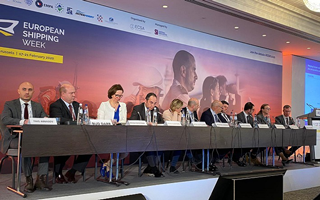From the News Desk: Has the shipping sector accepted new EU emissions rules are inevitable?
The mood at European Shipping Week was one of acceptance that decarbonisation regulations are on the way sooner rather than later, but there is still disagreement over the best way to tackle the issue
Europe’s four leading carriers have taken the bold step of agreeing to work in collaboration to help decarbonise the shipping sector, while there appears to be a growing acceptance within the industry that new EU rules on limiting emissions are on the way – and sooner than many would prefer.
IN AN extraordinary session at European Shipping Week last week, the sustainability and regulatory chiefs from Maersk, MSC, CMA CGM and Hapag-Lloyd said they will work together on environmental issues and pushed for a global initiative to support research and development through a previously-announced and independently-run $5bn fund.
The fund will be powered by mandatory payments based on fuel consumption and the carriers used the Brussels event to lobby regulators to throw their support behind the industry-wide scheme.
While biofuels trials and individual sustainability projects are already running, the four carriers agreed they could only do so much behind closed doors to push the decarbonisation agenda. “We are not very good at collaborating with people, in all honesty,” Maersk director of regulatory affairs Simon Bergulf admitted. “We have not been really good at that.”
CMA CGM sustainability chief Guilhem Isaac Georges also said it is essential to accelerate R&D to get to zero-emissions vessels. “Betting today on technology to break through in 2035 to achieve carbon neutrality in 2050 seems to us very risky. That is why I insist that we have to take these decisions today,” he said.
Since its public unveiling late last year, the R&D fund proposal has received a mixed reception.
“We are creating a neutral body looking at possibilities over which we do not have the faintest clue. This will enable a level playing field,” Hapag-Lloyd environmental management director Wolfgang Guntermann said in support of the idea.
But others question whether this would delay the adoption of a market-based measure in the International Maritime Organization, a point that has caused frustration among the project’s backers, who see this as a conflation of R&D funding and market-based measures, which are two distinct issues.
MSC Group executive vice-president for maritime policy and government affairs Bud Darr said there has been “perhaps deliberate misinformation” on the proposal and said the inability of governments in the IMO to agree on an MBM in the past is their responsibility.
“But what has not happened is the industry being an impediment to moving forward on a market-based measure. That is simply misinformation by those who simply want that result,” he said.
EU emissions cap
 The EU’s emissions trading system (ETS) is a daunting one for many in the industry who argue that regional rules cannot work in an industry that operates on a global stage.
The EU’s emissions trading system (ETS) is a daunting one for many in the industry who argue that regional rules cannot work in an industry that operates on a global stage.
This is nothing new, of course. The last time Brussels hosted European Shipping Week, in 2017, emissions regulation was also one of the central issues.
However, as Lloyd’s List’s Anastassios Adamopoulos writes in an opinion piece, the difference at the same event three years on was a striking sense that there is now an apparent acceptance that the EU’s plans to regulate shipping will materialise, and that the momentum behind their adoption is simply too strong to stop.
Therefore, the attention is turning to how these measures can be introduced in a way that will cause the least amount of disruption in terms of costs, operations and global competitiveness.
Nevertheless, it is very clear that while there is agreement on the overall decarbonisation goal, there is a disconnect between policy makers and stakeholders on how to get there.
The Green MEP behind the European Parliament drive to reduce shipping emissions through tougher regulation is Jutta Paulus. Last week she spoke to Lloyd’s List about why she feels the EU needs to take the lead in climate ambition globally and criticised the IMO for having “a track record of trying not to rush, trying to not to be too far-reaching with anything”.
For Ms Paulus, who attended an IMO meeting last year, the feeling is the global regulator’s approach is largely ineffective in reducing emissions in shipping.
Trying to convince the “last climate denier” will not get you anywhere, she argues. “I think it has always been the same in climate politics. You have to have some ambitious people stepping forward and then inviting others to follow,” she said.
In a draft report, she sets out plans to target ships of 5,000 gross tonnes and above that use EU ports to slash their carbon intensity by 2030 by at least 40% compared with 2018 — 10 years ahead of the IMO’s baseline for the same target. This would affect almost 12,000 ships.
You can hear more on Ms Paulus’s views, in her own words, in the latest Lloyd’s List podcast available via this link.
Outlook weaker for US Gulf exports
 Meanwhile, the oil trade has been in the spotlight in the past week.
Meanwhile, the oil trade has been in the spotlight in the past week.
New data from Lloyd’s List Intelligence indicates an intriguing change in the trend of crude tanker tonne-mile demand out of the US Gulf. Tonne-mile demand measures distance travelled by volumes carried and is a proxy for vessel demand.
The US Gulf is at the epicentre of American energy independence and the region’s rising exports of oil and refined products have reshaped global trading patterns for tankers and gas carriers since 2016.
However, the tonne-mile demand data from Lloyd’s List Intelligence challenges the assumption that the eight-fold rise in US Gulf oil exports over the past three years is positive for tonne-mile demand for crude tankers. Analysis suggests that while this was initially true, the trend reversed in 2019.
Additionally, not only are there signs that the pace of US crude export growth will slow in 2020, but also these trade flows are unlikely to augment tonne-mile demand for crude tankers. US Gulf refineries are importing less crude from farther-away destinations, particularly the Middle East Gulf.
The prediction that the rapid growth in US Gulf crude exports is likely to be on the wane was also backed up by presenters at an energy forum in London this week.
US shale producers need $60 per barrel to be cash-flow positive, Chris Midgley, head of analytics for S&P Global Platts, told the 700 delegates attending the London Energy Forum on Monday. A long-term view of $55 per barrel “means they’re in trouble”, he said.
As a result, production growth is going to slow in 2021, while 2020 would be the last year of breakneck pace that has seen exports increase since the US government opened up the market to international buyers in 2016.
Mr Midgley added that many shale producers have debt maturing in 2022, estimated at $30bn. As a result they would not be investing in drilling, and instead would divert cash to pay back debt.
Lloyd’s List Awards
 Entries for the 2020 Lloyd’s List Awards series are now open, with regional events taking place in New York, Singapore, Dubai and London this year.
Entries for the 2020 Lloyd’s List Awards series are now open, with regional events taking place in New York, Singapore, Dubai and London this year.
Don’t miss your opportunity to celebrate excellence in shipping with the industry’s flagship awards programme. Category winners at each regional event will also automatically be put forward for the Lloyd’s List Global Awards in January 2021.
For more information on deadlines, categories, criteria and previous winners, follow the link in the event title below:
LLOYD’S LIST AMERICAS AWARDS 2020 – New York
Entry deadline = June 5, 2020
LLOYD’S LIST ASIA PACIFIC AWARDS – Singapore
Entry deadline = June 26, 2020
LLOYD’S LIST SOUTH ASIA, MIDDLE EAST & AFRICA AWARDS – Dubai
Entry deadline = August 2020 (TBC)
LLOYD’S LIST EUROPE AWARDS – London
Entry deadline = September 11, 2020

